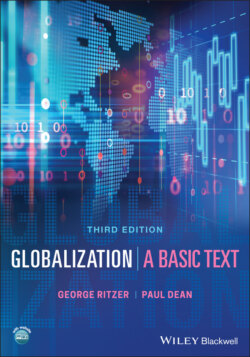Читать книгу Globalization - George Ritzer - Страница 69
THE NEW IMPERIALISM
ОглавлениеSeveral theorists have argued that new twenty-first century forms of imperialism are what drive changes in our world (Ghosh 2019; Harvey 2003). David Harvey (2003) has articulated the idea that a “new imperialism” has arisen with the United States as its prime (if not only) representative. He calls this “capitalist imperialism” and sees it as a contradictory fusion of economics and politics. Thus, Harvey offers a more integrated view of imperialism than did Lenin or Hobson. More specifically, it involves a fusion of the political – “imperialism as a distinctively political project on the part of actors whose power is based in command of a territory and a capacity to mobilize its human and natural resources towards political, economic, and military ends” and the economic – “imperialism as a diffuse political-economic process in space and time in which command over and use of capital takes primacy” (Harvey 2003: 26). There are fundamental differences between the two (political interest in territory and capitalist interest in command, and use, of capital), but the “two logics intertwine in complex and sometimes contradictory ways” (Harvey 2003: 29). For example, to the American government the Vietnam War made sense from a political point of view, but it hardly made sense from an economic perspective and may even have adversely affected the American economy. More generally, Harvey wonders whether we are now seeing an increase in US political imperialism (e.g. Iraq and Afghanistan) while it is declining in importance from the perspective of economic imperialism (e.g. the rise in economic power of China, the EU, India, etc.).
To Harvey, the new imperialism is the uncomfortable mix of these two types under the broad heading of capitalist imperialism. In addition, what is “new” here, at least in reference to the classic imperialism of say the British, is that it is the US that is the paradigm for, and the leader in, the new imperialism. Harvey not only describes US imperialism, but is highly critical of it. He sees it as burdened by a series of internal and external contradictions and problems which make it unsustainable in the long term (and perhaps even in the short term).
Ghosh (2019) adds that another new element of the new, twenty-first century imperialism is less about direct control of land and more exercised through global institutions (see Chapter 6), international regulations, and multilateral agreements. Imperialism continues to be shaped by large capital controlling the economic territory of smaller capital, but it is now more subtle. It includes, for example, the privatization of services (e.g. water, health, education, sanitation) that were once administered by local and national governments, and are now controlled by large corporations in more powerful countries. Ghosh is less concerned with the US as a sole imperial power and instead argues that, with the exception of China, the relative power of geopolitical regions within global capitalist imperialism persists. In other words, the new imperialism largely maintains global inequalities and power relations, but through different means.
